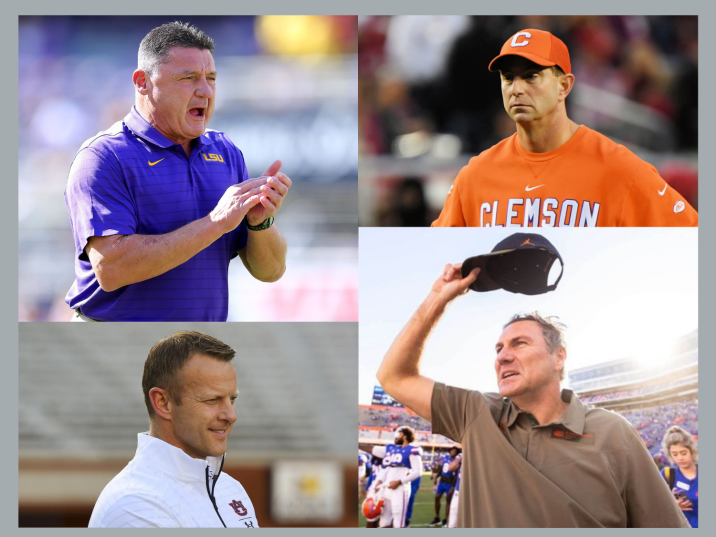Dean Richard Franza’s column appeared in the Sunday, December 5, edition of the Augusta Chronicle. The post can be viewed here.
As regular readers of this column know, I am very much into sports and in particular college football. Such readers might also remember that I like to justify the amount of time I spend watching and following sports by attempting to learn things from sports that I can apply to the business arena.
One area that has piqued my interest of late is the firing and hiring of college football coaches. In particular, I am fascinated by how quickly these coaches can fall out of favor with their bosses – athletic directors, university presidents and trustees – and lose their jobs despite being owed millions of dollars. As I examine such coaching moves – not just firings, but also new contracts – I think there is much to learn that we can apply to business.
Patience and continuity: If you look at the teams contending for the College Football Playoff, you will see that each has a long-tenured coach: Georgia (Kirby Smart, sixth year), Alabama (Nick Saban, 15th year), Michigan (Jim Harbaugh, seventh year), Cincinnati (Luke Fickell, fifth Year), Oklahoma State (Mike Gundy, 17th year), Notre Dame (Brian Kelly, 12th year). Even more interesting is that Harbaugh, Gundy and Kelly have been on the proverbial “hot seat” during their times at their respective institutions, yet their schools stuck with them despite some mediocre or bad stretches. But while Notre Dame stuck with Kelly, Kelly didn’t reciprocate – he announced his departure recently to coach LSU.
A striking example from the past is Frank Beamer, who won less than 40% of his games his first six years at Virginia Tech and then had his team regularly in the top 20 for the next 20 years. Do you think he would have had such an opportunity in the current environment?
You might want to also look at Dabo Swinney’s first three years at Clemson and basketball’s Mike Krzyzewski’s first three years at Duke and you will realize their seats were pretty warm entering their fourth years. In many of these cases, the lesson learned is to have patience when it comes to results if you feel have hired the right person.
In addition, if you have to fire someone quickly, you lose continuity and everyone in the organization is adapting to someone new. If you believe you have made the right hiring choice, be patient and maintain continuity, as this will often result in long-term success.
On the other end of the spectrum are the recent firings at LSU and Florida, which struck me as impatient. Ed Orgeron was less than two years removed from a national championship at LSU and Dan Mullen had two top-10 finishes and one top-15 finish in his first three years at Florida when both were fired this year. LSU owes Orgeron $16.8 million while Florida owes Mullen $12 million after signing him to an extension this past June. In addition to paying out all of that money, each school’s program will have to “reset” under a new coach.
Unrealistic expectations: I think one of the major reasons that both Orgeron and Mullen was fired was that their schools expected them to compete for conference and national championships every year.
I think these are examples of unrealistic expectations. Schools see what Saban has done at Alabama and to a lesser extent Swinney at Clemson and Ryan Day at Ohio State, and expect their programs to be great every year. Unfortunately, this is not possible, particularly at places that compete in ultra-competitive environments or who do not have the resources to compete.
In business, we need to think similarly. While we should expect our leaders and employees to work hard and achieve, our expectations need to be moderated by both their competitive and resource environments.
It’s all about fit: When hiring a new coach, both school and coach need to think about how that coach fits with that institution. This often means hiring a coach who is an alum of the institution such that he really understands its culture (e.g., Smart, Harbaugh) or relates to his potential players and fan base (e.g., Swinney).
The lack of such a fit makes me question the long-term viability of Bryan Harsin at Auburn and Kelly’s decision to jump to LSU. As business leaders, we can learn that it is not just about the talent of a potential employee, but also how well he/she fits your organization.
Beware of bidding against yourself: In our current environment, both in business and in college football coaches, there seems to be a scarcity of talent, resulting in the need to pay more for that talent. However, sometimes that can lead to significantly overpaying for talent.
For instance, recently Michigan State rewarded Mel Tucker with a 10-year, $95 million contract. I do not think anyone else was going to pay that much, even though Tucker has shown to be a good coach. Closer to home, do you think Georgia Tech should have signed Geoff Collins to a seven-year deal? Not likely, when in retrospect you consider his nine total wins his first three seasons.
So, as business leaders, beware of being so enamored with talent that you significantly overpay.
Employees – strike while the iron is hot: As an employee in the current environment, you might want to take advantage of it. Lincoln Riley (Oklahoma to Southen Cal) and Brian Kelly (Notre Dame to LSU) took advantage of the current coaching environment to cash in on great deals.
The lesson here for employees is that there can be times that are more beneficial to move for big paydays. However, be cautious of the message it might provide to a potential future employer.
As you can see, I am learning much from following college football, and hopefully you can take the lessons I have learned and apply them to your business. I think it will make following the coaching carousel more interesting for you!







